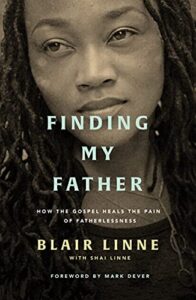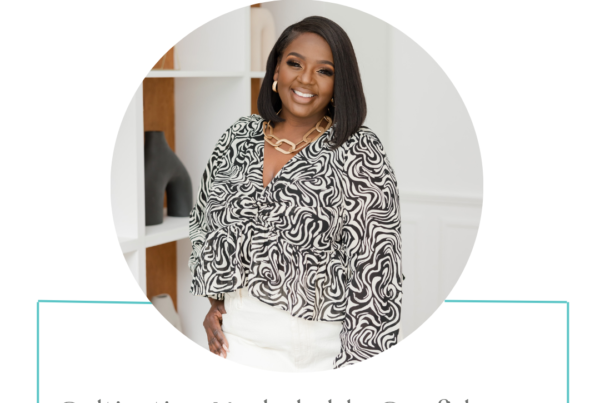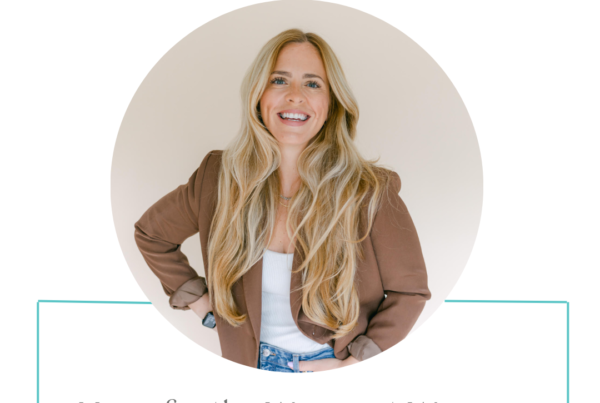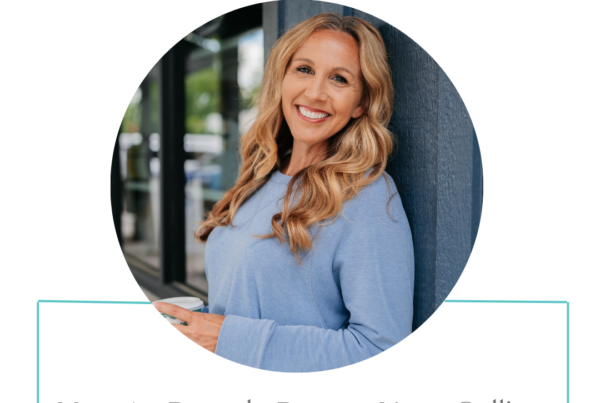Blair Linne , author, speaker, actress, and spoken word artist, shares her story of experiencing the pain of fatherlessness and offers an invitation to be loved by a Father who will never abandon us. Blair’s personal story of growing up without a father at home reflects the experiences of millions. She shares how the gospel reshaped her identity and transformed her life. Our conversation with Blair will help girls and women with father wounds shift their eyes from what they do not have in their earthly fathers (who, whether present or absent, loving or the opposite, can never be perfect) to what they do have in their eternal Father, who will never disappoint, reject, or abandon them. Be encouraged that no matter what your story is, the gospel promises not just forgiveness but also a place in God’s family, experienced in a local church, where you can enjoy the fullness of his fatherly joy, care, wisdom, provision, protection, and security.
Visit the show notes at wonderfullymade.org for noteworthy links and more information.
—
Watch the episode here
Listen to the podcast here
Finding God As Your Father — With Blair Linne
What does it mean that God is our Father? How can you learn to trust Him when your earthly father has let you down? We have spoken word artist, poet, speaker, author and actress, Blair Linne with us to speak to this important question. Blair is known as one of the originators of the Christian spoken word genre. Her acting career includes appearances in shows like Days of Our Lives, Alias, Malcolm in the Middle, Boston Public and more. She’s written poetry for Sprite, Neutrogena, NBC, and The Gospel Coalition. Blair released her book, Finding My Father: How the Gospel Heals the Pain of Fatherlessness. Blair, we’re so happy that you’re here with our community. Welcome.
Thank you. I’m glad to be here with you.
You grew up with your sister and your mom in South Central LA. Is that right?
That’s right.
From the little bit that I’ve heard about your story, there were times when you were struggling as a family, a single mother, providing for two girls, and your father was not in the home. Will you share a little bit about your upbringing? Anything you want us to know about what it was like growing up for you and your relationship with your dad?
When my mom found out that she was pregnant with me, she was planning to abort me because she was already a single mother. She had my sister when she was seventeen. She was pregnant with me at 21. She decided through some circumstances that I explained in the book that she was going to place me for adoption. She then decided she was going to keep me. Like many single mothers or single parents even, my mother sought to give us the best life that she could. She moved us from our small town to Los Angeles, California, because she wanted to raise my sister and me in the entertainment industry and provide an opportunity for us. With that though, life was challenging.
Who you are at your core doesn't shift when your situation shifts Click To TweetWe struggled with poverty. I remember counting up the number of times that we moved from that initial move to Los Angeles up until I was able to get my own apartment. It was 25 times that we moved. The longest stint of having a home was a three-year period. It was a lot of transition. He’ll follow his children, who tend to struggle with poverty. I also struggle with authority. I respected my mom. I wasn’t going to talk back to my mom, but when it came to other sources of authority, that was a challenge for me. Part of that was my relationship with my dad. He lived 2,000 miles away. I would talk to him over the phone at times.
Maybe a call a year. For some years, I didn’t hear anything from him. It depended upon the year. When we did talk, it was maybe a 5 to 10-minute conversation. It was all very surfaced because we didn’t know each other well. I remember maybe around nine years old, hungering and thirsting in a sense for more from him. I desired to be known by him and I desired to know him, but I was too afraid to speak up. I felt like if I communicated my desire and my concern about how the relationship was going, maybe I would lose the little bit of what we did have. I kept my mouth quiet and put up with the phone calls here and there. There were times when we would go back and visit family in the Midwest.
I would get a chance to see him during those times. It was certainly a challenge. He wasn’t there to see how we were struggling. Because we had made a big move coming back home to the Midwest, it wasn’t like we were sharing with all the family like, “This is what we’re going through.” We put on the front like, “We’re doing okay.” As I grew older, I realized how much of a struggle it was to understand my identity as well. That is a big part of our lives that a father plays a large role in speaking life into us and blessing us, and not having that was something that was a challenge.
When guys started expressing interest, I remember thinking around eighteen, I don’t even know what to look for in a guy. The person who was supposed to be there to model this for me had not been there. It was definitely a challenge. It wasn’t until I was eighteen that I mustered the guts to tell my dad how his absence had affected me. When I had that conversation with him, it was transforming because he expressed his own fears about being a father and how his father wasn’t there for him. It helped me to see his humanity.
I looked at a father as a superhero in a way. I still look at the television for examples of fatherhood. The Cliff Huxtable or Leave It to Beaver. We were watching Nick at Nite, these old ‘50s shows. That was how I viewed a dad but it wasn’t a real picture of a father. That would come later. To see his humanity helped me to see, “He’s as broken as I am. He’s as needy as I am.” I saw his humanity for the first time after that conversation.
This word identity, the identity and the humanity of your earthly father figure, will you speak more to us about this piece of identity for you? We know that about 1 in 3 homes globally are fatherless. That doesn’t account for the homes where the father is physically present but emotionally absent or physically abusive fathers or whatever. This issue of identity connected with our father figure is something that most of us who are here with you have struggled with. Will you speak to that piece for us?
I started acting and doing poetry when I was nine years old. I started in the theater. It was when I was around thirteen that I did my first commercial and then moved on after high school to do television and things like that. You’re in an industry where your gifts are exalted, which is probably the most interesting industry. It’s very easy to take that on and say, “This is who I am.”
The challenge with that is when work dries up, you may not feel as you are. You may feel, “Is something in me lost when you don’t get the roles that you desired to get?” It’s a temporary fix. Despite the Lord providing these opportunities and these roles, which were great throughout my life, what I realized was that they cannot be the basis of my identity.
Even though people were telling me, this was the basis of my identity, and some of the churches that I attended when we were coming up were a little more prosperity-focused as well. There was this connection that people would make in their minds, “You’re doing this work. God is blessing you.” Who you are was based upon what you would do versus what the scripture tells us, which is that who we are is not at all based upon what we have done or can do. It’s based upon the dignity and the honor that the Lord has given us as image-bearers.
Fatherhood originates with God. He is the essence and the truth of that concept. He was a father before this world began. Click To TweetAs a Christian, it’s based upon our connection with Christ. We have a new identity that will never shift and never change. We all have to come to that conclusion, whatever we seek to exalt in our life, whether that’s our education or our work or our family, and wanting to associate ourselves with that thing so much that this is who we are at our core. What the scripture tells is that, at the core, these are things that you do. This is maybe your function or the role that the Lord has given or the gifts he has given, but who you are at your core doesn’t shift when your situation shifts.
Even in my story in my search for identity, even as you said, you could have a father right there in the home but still struggle with identity. The reason is that we have to find our identity even outside. The Lord has given men, fathers in particular, a call to pour into their children, but ultimately to point them to the one who will give us our identity. Without that, we’re still going to be lost and tossed to and fro. I didn’t have a father to point me to that but by God’s grace, as my Heavenly Father, He was able to help me to see who I am.
It wasn’t wrapped up in anything that I did. It’s not something that can be lost because I make a mistake or I have a job or don’t have a job, or the seasons where we had more money or the seasons where we struggled, that wasn’t the litmus test for who I was. I’m grateful and we’re constantly learning. It’s not like, “I have it all figured out. I know exactly who I am in every single way.” We’re constantly learning and growing in this life. I do know enough of who I am that I know it will not shift or change. I’m thankful for that.
Was there a turning point for you? What was your process in that shift of identity that is such a necessity for all of us? You said it so well. Our earthly fathers are human beings. It’s a cliché that people use, but it is true that God has shaped hole in the very core of each of us that we try to stuff with a bunch of other things, including good things like our relationships with our parents or even using our gifts, but none of that will do it. It’s all temporary. What was your process in transferring that to God? What was that like?
What transformed my life was when I came to Christ. I had made a profession of faith when I was nine years old, the same time I started acting and doing poetry writing and everything. When I was 22, someone shared the gospel with me very clearly. What was different was for the first time, I saw how God sees and knows the heart. He knew my heart. I couldn’t hide and compare myself to someone else to get out of any conviction or to make myself feel better about myself.
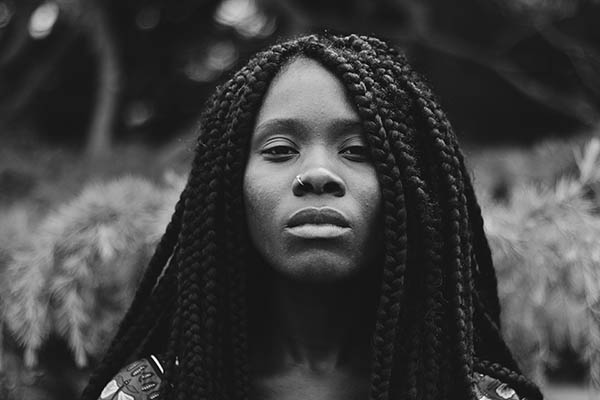
God As Our Father: Who we are is not based on what we have done or can do. It’s based upon the dignity and the honor that the Lord has given us as image-bearers.
Long story short, when I began to agree with God and his word, it helped me to see that I needed a savior. Not just so that I didn’t go to hell. That’s why I responded to an altar call at nine, because it was like, “I don’t want to go to hell.” Every church we would go to, I would go back up again because I wanted to be sure that it was real. When I understood, “I’m guilty before God. I’ve sinned against Him. I am in need of a savior, someone outside of myself and outside even of my morals and ‘the good things’ that I would do with the ways that I would serve in the church, my acting career, writing poetry, and the gifts that I have. I needed a savior.”
When I went into prayer and asked the Lord for forgiveness but felt completely hopeless at that moment, I was reminded that’s why Jesus came. He came for sinners like me, for those who are totally immoral and running away from God in that way, or those who are totally self-righteous and running away from God in that particular way.
When I saw that, I realized for the first time, “This is why it’s good news, because there was bad news.” When I embraced God’s good news and I embraced Jesus and realized that He was the only way, I couldn’t climb in some other way. I began to rethink everything about my life. I began to rethink acting and the gifts that I would use because I thought, “I’ve used these gifts but my motives were totally self-centered.” Even at that time, I had been writing poetry with scripture in the poetry because I was a professed believer.
Other people are being encouraged by it but I’m like, “Why am I doing this?” Because my identity is in this, I don’t want to do this for selfish gain. I don’t want to do this because I feel that my value is connected to these things. As I began to rethink, I remember praying, “Lord, I don’t need to do anything. I just want to be with you.” The Lord does have works for us to do.
We can trust Him and He can help us to continue to cast over even our impure motives as we are believers. We can honor him with the things that we’re doing. I didn’t understand that at the time. I was like, “I don’t need to do anything.” It was a process. As I came to Him, I realized I was still struggling with self-righteousness and still feeling like I had been forgiven by a holy judge.
Our fathers are broken. Often, our fathers are needy. They're humans who are in this fallen world. They need hope and help. Click To TweetI’m grateful for that forgiveness, but I almost felt like God was just tolerating me. It was this transaction like, “I saved you. Now, you need to keep this thing going, so work hard,” but striving in my own strength, not striving in the strength that the spirit provides. It took me a while to get to, “God is also my Father.” It took a couple of years to realize he’s more than a judge. He wants to be my loving Heavenly Father. It was through opening up scripture and not looking at God through the lens of my brokenness and looking at him through the lens of my earthly father, who appeared not to want much to do with me.
I interpreted through that lens and concluded, “Maybe God doesn’t want much to do with me either.” It’s almost like He extended mercy but almost like there was a disconnect. There wasn’t joy or glory. The fact that I’m His, the scripture says, “In love, He predestined us for adoption.” It wasn’t just transactional. This is His will. This is His delight that we are His children. It was re-reading scripture in context and for the first time, understanding who this God is. When I began to open up the text and see Him as the loving Heavenly Father he is, I was like, “I didn’t see this before. I didn’t see His mercy here. I didn’t see His love here.”
He’s not waiting for me to make a mistake so that he can bring out the team and destroy me. He’s a God who’s filled with mercy, who loved when I was still in my sin, who chose me before the foundation of this world to be His, realizing that fatherhood didn’t originate with my earthly father. It doesn’t originate with even the best earthly father. Fatherhood originates with God. He is the essence and the truth of that concept. He was a father before this world began.
Any man who’s coming alongside and now able to share within that title is merely to be a plainer to him, the great Father. It was through the scripture because I don’t find a lot of people emphasize the fatherhood of God so much. Here and there, we may hear about it. It was through my own personal experience, crying out to God at times where I didn’t feel even that I was being fathered and asking God, “Father me, parent me. I need you.” Going through suffering and trying times, I realized that I could go to my Heavenly Father. I don’t have to tiptoe into his presence. I can boldly approach the throne of grace because of Christ.
When you were sharing it, it made me think of something. For everybody reading this, any little glimpse that we have gotten of love from our earthly fathers or a father figure, that’s a tiny little insight or a drop from the ocean of God’s love. It helps me to think of it that way because when we try and take our understanding of our experience of fatherhood here on earth, there is certainly brokenness that is going to make it difficult for us to either trust God or believe that He loves us.
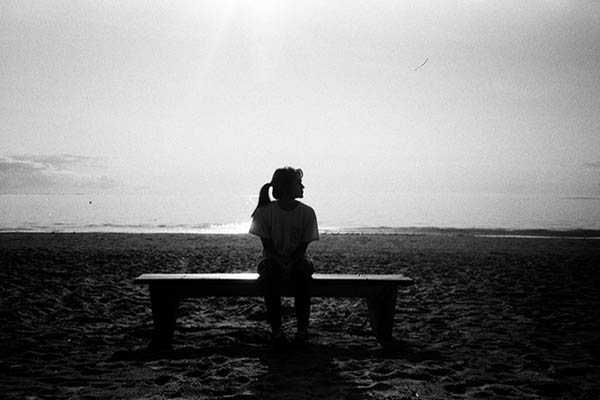
God As Our Father: God is more than a judge. He wants to be your loving Heavenly Father.
To your point, whether it’s self-righteousness or whether it’s drugs, alcohol, sex, and all these other things, there’s going to be something there that is going to be our own blocker. It’s like our own shield that we put up, and then we’re like, “God, where are you?” It’s that mindset. I like flipping it and thinking any little piece of goodness or any little piece of love that I’ve experienced from a father figure here on earth is a little tiny taste and aiming to see it through that view.
I feel like we’ve touched on so many things, and thank you for sharing everything you have, Blair. I want to ask you, what would you like to share with a woman reading this who’s struggling to understand God’s character as Father or receive that love from Him? What would you want to share with her?
For one, my encouragement is to take whatever cares, concerns, anxieties or fears that you have about your Heavenly Father, things that maybe you are struggling to reconcile with your relationship with the Lord, those things that may be hindering you and keeping you from Him, to take it to Him in prayer. The truth is he knows about your suffering. He’s familiar with your circumstances and your pain. He sympathizes with you in that pain.
Rather than bottle it up, sometimes we don’t even realize the extent of our hurt or our pain, or maybe bitterness or unforgiveness, whatever the feeling is that’s happening inside. If you’re unaware of what’s going on, journaling has been extremely helpful for me. Writing out or if you’re not a writer, maybe you can use a voice app to record your own thoughts and your story about your own father, whether good or bad.
You can either take that before the Lord and say, “I’m going to be honest and come clean and be bare before you, and trust that you are able to heal the deep parts of me that maybe no one else knows about.” One of the things that have been extremely helpful for me is when we think about spiritual adoption, which the Bible speaks about, not only do we gain a father in God, but we also gain a family in the church.

My prayer too is that you’re in a healthy and thriving church community that can also help you along with some of these concerns or issues or struggles that you’re having. May the Lord provide within the church who has a call biblically to care for the fatherless. This call is all through the scripture to check in on those who are underserved and the least of these, who are often go forgotten. Reach out if you see a godly family. The Lord used several godly families in my life even before I got married to help me along and to observe them and say, “This is what a father is like. This is what it looks like for a father to care for their family.”
Maybe you can have it in your heart to get to a point where you can pray for your father. If your father is alive, with a good father or you have had a father who had a lot of hardship and wasn’t there, that you would be able to pray and thank God for your father to get to that point, which it’s a process to get there. I remember even thinking when I was about three or so years old, my dad would come with a brown paper bag filled with candy. He would come and give it to me, my sister and my cousin. Praise God for that.
As you’ve said, it’s a small thing but here is a shadow pointing to my Heavenly Father. Here’s a means of grace in a sense and the common grace of my father showing love. I can be thankful for that. Even if you don’t have those things, you can be thankful for the fact that you are here. God uses your father because He wanted you to be here, and He wanted you to be here ultimately to know Him.
You can thank God for that. We need to pray for our fathers. We need our fathers. I know not every situation is a safe place where we can have a relationship with our father at times, but you can pray for your father, that your father would come to know your Heavenly Father. Our fathers are broken. Often, our fathers are needy. They’re humans who are in this fallen world. They need hope and help. Even becoming a parent has given me so much clarity on how challenging it is for parents. A lot of the time, we have fathers who are dealing with many different issues. Sometimes with your father not being there, that doesn’t mean that he doesn’t love you.
Sometimes we center ourselves on the reason why our parents were not who they should have been. We make it about us, especially as children. It’s hard to process. If your parents divorced or something like that, it’s hard not to put yourself in the center. As we grow and we mature, we realize, “This has nothing to do with me. This is their choice. My father made a choice, and this doesn’t say anything about who I am or who God is calling me to be.”

When we release that and we can begin to heal from that, we can walk in the identity that God has for us. We can fully embrace what it means to have God as our Father. Lord willing, we can pour into the next generation. We can pour into whether we have biological children, whether we foster children, adopt children or make disciples. You can be a single person who says, “I’m going to pour into the fatherless children in my pews who come to church with me.”
You can’t do that until you begin to process your own story and heal from your own story, and then you can help bring forth your legacy. You can say, “These sins are going to stop here with me and Lord willing, the next generation won’t have to suffer like I had to suffer because of the gospel and because there’s good news available in Christ.” That is my prayer, that we would have a high view of our fathers. My calling in the book is not that we say, “We don’t need men.”
Our society tells us, “No, we do need men.” Not just men to come back to our home. We need men who will return to their God. You can have a father right in the home who is emotionally or spiritually absent or worse, abusive. It’s beyond having a man come into the home. Ultimately, we need our Heavenly Father. He makes all the difference in the lives of those who are fatherless and in the lives of the fathers who need to pour into the lives of their children.
I’m thinking about how you shared that you had this conversation with your dad. His response was, “I never had a father.” My father was absent too. When you said that thing about false identities, this is a big thing, so often, we take whatever the wounds are of our parents. We either perform or go the wrong way, and then we take on this false identity. That key of forgiveness is so huge. I love what you said about journaling. Another practice that counselors sometimes even will ask people to do is, “Write your dad a letter. You never have to send it. Just say everything you never said that you wanted to say.”
I love what you’re saying about getting it all out there and then praying. As much as you can, give it to God. I feel like it’s a process, isn’t it? Eventually, maybe you’re reading this, and that is a conversation you want to have with your dad. Maybe it’s going to be a process to decide what you want to say. What’s going to be helpful now in the relationship? What kind of relationship do you want now?
Blair, you wrote a poem that so beautifully shares the essence of your story. I almost hesitate to recite pieces of it to you because you’re such a beautiful and eloquent speaker with this most amazing cadence but God will help me. It begins, “Growing up, my daddy was not an easy chair. He was a chair that folded. Since daddy’s arms weren’t there, I could never recline. My home was never where my daddy was. I’ve had to look to the potter, and I’ve found a new home since finding my father.” I love that picture of our Heavenly Father being a home for us. In closing, if you could give your younger self some words of wisdom, how old would she be and what would you tell her?
Interestingly enough, I probably would speak to nine-year-old Blair. There was so much happening when I was nine. I made a profession of faith at nine. I started writing poetry and acting at nine. What I would communicate to nine-year-old Blair is it’s going to be okay. You have a Heavenly Father who is present, with all his shifting, changes, and the ups and downs that you will experience. There is stability. If you can find him, you will have a home and sanity. You will have everything that you need in Him.
There’s no need to lie or pretend to have more than you have. There’s no need to put a front for other people or to pursue emotionalism. Often, I look at my time in church back then as I was so empty. I was desperate for this religious experience with God to tell myself that the Lord is here. He’s present. You don’t have to work to earn His satisfaction or delight. He loves you. He cares for you and He will be with you forever. Don’t worry. It will be all right.
It reminds me of this song by Jimmy Cliff. Who sang, “Every little thing is going to be all right?”
Was that Bob Marley?
Don’t worry about a thing. Every little thing is going to be all right. That’s so comforting. Our hearts need that. If you’re reading this, what we like to do is we like to say, “Everybody but me.” That’s all well and good for all the rest, but you don’t know the thoughts I’ve had. You don’t know the things I’ve done. You and me together, girl, whoever you are.
We are all in that same boat where we’ve all singled ourselves out and said, “I went way too far off, even in my thoughts or in something that I’ve done.” God leaves the 99 and this is for you specifically. You know who you are. Blair, thank you so much. Thank you for writing this book, Finding My Father: How the Gospel Heals the Pain of Fatherlessness. Thank you for being here with us. It’s good to meet you.
It’s nice to meet you too. It was great to be on. Thanks so much.
Important Links
- Finding My Father: How the Gospel Heals the Pain of Fatherlessness
- https://www.YouTube.com/watch?v=hx4DS5-NGaE
- https://www.BlairLinnePoetry.com/
About Blair Linne
 Blair Linne is a Christian spoken word artist, actress, and Bible teacher. Blair is recognized as one of the originators of the Christian spoken word genre.
Blair Linne is a Christian spoken word artist, actress, and Bible teacher. Blair is recognized as one of the originators of the Christian spoken word genre.
At 13, she was one of the youngest contributors to the Anansi Writers Workshop at L.A.’s prestigious art forum, The World Stage. Since then, she has toured globally, proclaiming the gospel of Jesus Christ through spoken word.
Blair lives in Philadelphia with her husband Shai Linne and their three children Sage, Maya, and Ezra; she serves in discipling women at Risen Christ Fellowship, where her husband is one of the founding pastors.

